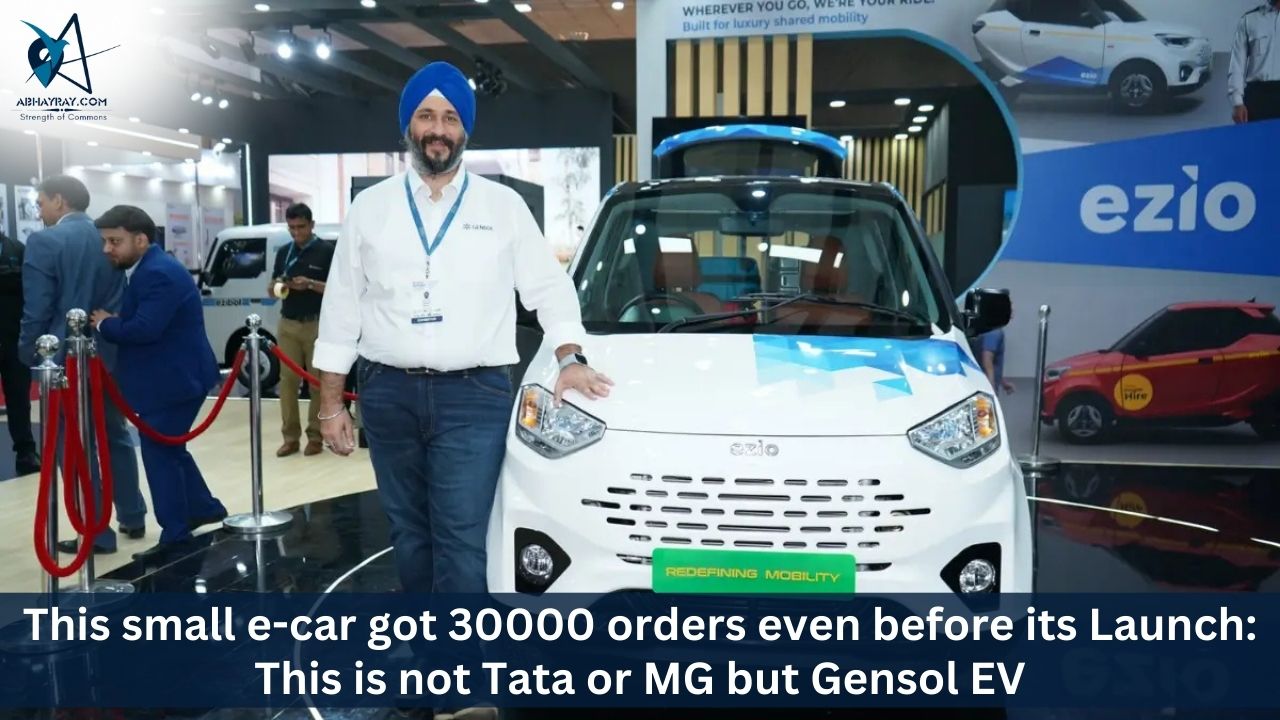Introduction
The Electric Vehicle (EV) market in India is booming, with consumer demand surging every year. The Economic Survey 2023 predicts that India’s electric vehicle market will see a 49% compound annual growth (CAGR) between 2022 and 2030, with annual sales of 1Cr by 2030. Looking at the broader market (which includes buses, vans and heavy trucks), tech research firm Gartner predicts that by the end of 2025, 85 million EVs will be on the road, a year-on-year increase of 33 percent.
The electric vehicle (EV) revolution is taking India by storm, and while premium EVs are gaining popularity, there’s a clear shift toward affordable options. Amid this growing demand, Gensol EV has made a bold statement in the market by securing 30,000 pre-orders for its small, three-wheeled electric car even before its official launch. This article delves deep into the rise of Gensol EV, about its flagship models, the reasons behind its unprecedented success, and why it’s being seen as a game-changer in the EV space.
The Growing Demand for Affordable EVs in India
India’s EV market is expanding rapidly, driven by increasing environmental concerns, rising fuel prices, and government incentives for green mobility. While luxury EVs like Tata Nexon EV and MG ZS EV dominate the headlines, a significant portion of consumers is now looking for cost-effective options that fit within their budgets.This is where Gensol EV has captured the market’s attention. Instead of competing with high-end EV manufacturers, the company has focused on creating practical, affordable, and innovative solutions for everyday use, especially for the B2B segment.
India is a price-sensitive market, so now the process of launching electric cars on a low budget has started in the country. This is the reason why now people are turning to electric cars. One such company is EZIO Electric, which unveiled its Gensol EV at the India Mobility Expo 2025 this time. After introducing this small electric car at the expo, it was well-liked. According to the company, even before the official launch, this small electric car of the company was liked so much by the customers that till now more than 30,000 bookings have been received. The company has had great success, although it is a B2B i.e. business to business order.
Launch Timeline & Strategy
Gensol Electric Vehicles Pvt. Ltd., a subsidiary of Gensol Engineering Limited, made a significant mark in the electric vehicle (EV) space by unveiling its first compact EV, EZIO. The event took place from January 17 to 22, 2025, at Bharat Mandapam, New Delhi. This unveiling is a milestone for Gensol as it aims to revolutionize urban mobility in India
It is a 3-wheeled electric car, but the company has designed it for taxi service. But it has a seating capacity of only 2 people. It is a 2-seater electric car. According to the company’s CEO Prateek Gupta, Ola has contacted us to know the possibilities of this car. Gensol EV has adopted a phased rollout strategy for its vehicles. The company can launch this car in the market in the second half of this year. First of all, this car will be launched in Bangalore. After this, the company is going to launch it in Delhi and other cities
- EZIO – The Compact Urban EV
A two-seater electric vehicle, EZIO is tailored for efficient urban commuting, offering a sleek design, smart features, and optimized space. Manufactured at Gensol’s greenfield plant in Chakan Pune, the EZIO aligns with India’s decarbonization goals. The plant boasts an annual production capacity of 30,000 units.
- EZIBOT – The Future of Urban Logistics
An electric concept cargo vehicle, EZIBOT is designed to redefine urban logistics with its focus on sustainability and operational efficiency
- Ajio Electric Car
The Ajio will hit the market in the second half of 2025 (July to December). Bengaluru has been chosen as the launch city, given its growing EV infrastructure and demand for sustainable mobility options. After Bengaluru, the car will gradually be introduced in other key markets like Delhi and major metro cities.
- Agibot Cargo Variant
The Agibot is scheduled for launch in 2026, targeting businesses and logistics operators looking for efficient and eco-friendly cargo solutions.
Testing and Battery Life
The company said that we have done rigorous testing of the cars in extreme conditions. They have been driven in all kinds of conditions, from the scorching heat of Jaisalmer to the heavy monsoon of the Western Ghats. After which we also successfully received our ARAI certification. The company’s batteries have 3,000 charging cycles, whereas earlier there were 800-1,000 charging cycles. This is important for fleet operators, as it gives a longer life to use life cycle. Pratik Gupta said that we are also collaborating with ecosystem partners to explore second-life applications for our LFP batteries. The choice of 48-volt system plays an important role in this strategy, as these batteries can be easily reused after 5-7 years of vehicle use. They can be directly used in mobile tower power backup and energy storage solutions.
The Competitive Edge – Why Gensol EV Stands Out
- Affordable Pricing
Gensol EV has positioned its vehicles as cost-effective alternatives to traditional fossil-fuel-based vehicles. This affordability has made it a top choice for fleet operators and small businesses.
- Targeting Untapped Markets
Unlike most EV manufacturers that focus on personal cars, Gensol EV has strategically targeted the B2B segment, addressing the unique needs of taxi operators and logistics companies.
- Commitment to Sustainability
From advanced battery technology to second-life applications, Gensol EV has prioritized eco-friendly practices in its business model.
- Customer Response and Market Impact
The overwhelming response to Gensol EV’s pre-launch bookings underscores the market’s growing trust in the brand. The company’s ability to secure 30,000 orders before launch indicates that consumers and businesses alike are ready to embrace sustainable mobility solutions.
With government incentives and infrastructure improvements in place, Gensol EV is poised to play a significant role in shaping the future of India’s electric mobility landscape.
Conclusion
Gensol EV has successfully carved a niche in India’s EV market by focusing on affordability, practicality, and sustainability. Its Ajio Electric Car and Agibot Cargo Platform offer cost-efficient solutions for both personal and commercial use, making them ideal for India’s urban landscape. As the company gears up for its official launch, the industry is watching closely to see how these vehicles will perform in real-world conditions. One thing is certain: Gensol EV’s innovative approach has already set a new benchmark in the electric mobility sector. For businesses and consumers looking for reliable, affordable, and sustainable electric vehicles, Gensol EV represents a promising choice.
GMICapitals.com RaysVeda.com GetMyStartup.com LawCanal.com GetMyIndia.com ZinCob.com Angeltors.com

